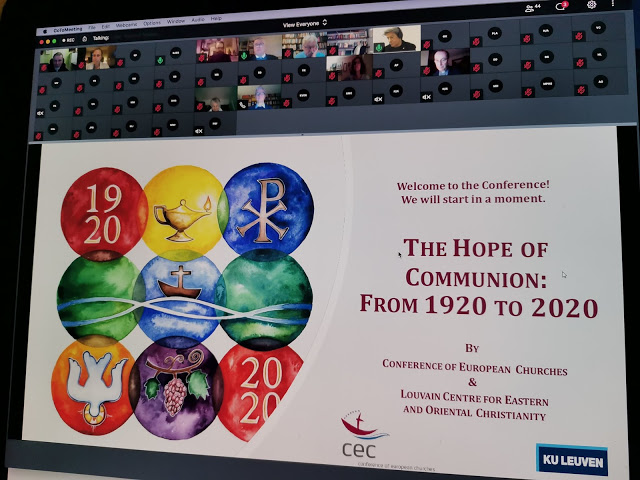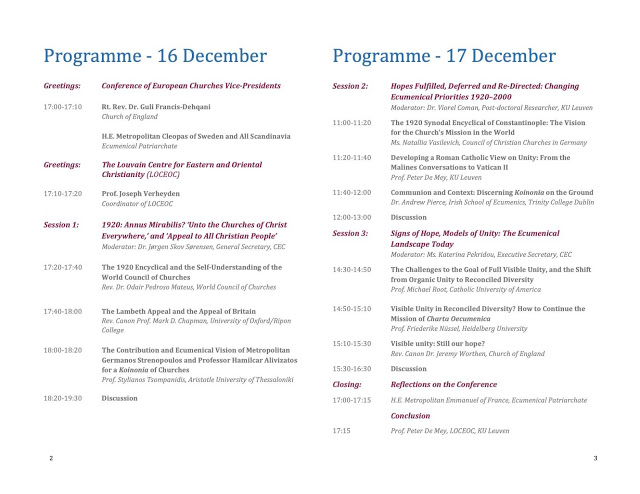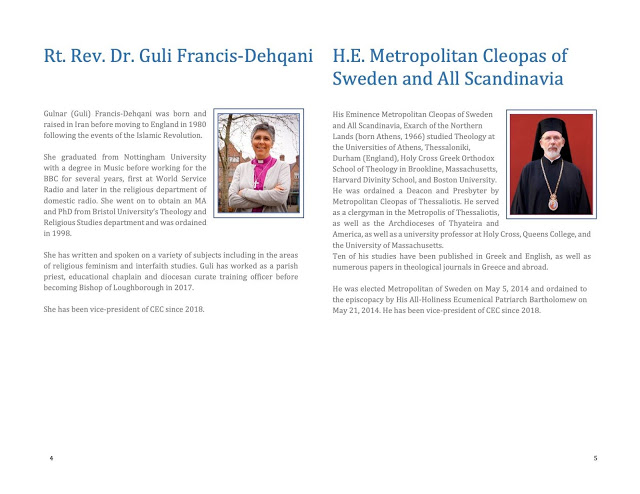
Χαιρετισμός Μητροπολίτου Σουηδίας Κλεόπα
στο συνέδριο Η ελπίδα της Κοινωνίας: από το 1920 στο 2020,
που οργανώνει το Συμβούλιο Ευρωπαϊκών Εκκλησιών
σε συνεργασία με το Κέντρο Ανατολικών Σπουδών της Λουβέν
16 Δεκεμβρίου 2020
Metropolitan Cleopas of Sweden’
Greeting
at The Hope of Communion: From 1920 to 2020
at The Hope of Communion: From 1920 to 2020
online Conference,
organized by the Conference of European Churches (CEC) & the Louvain Centre for Eastern and Oriental Christianity
organized by the Conference of European Churches (CEC) & the Louvain Centre for Eastern and Oriental Christianity
December 16, 2020
I greet you in the name of our Lord and Savior Jesus Christ and convey the blessings and warmest wishes of His All-Holiness Ecumenical Patriarch Bartholomew of Constantinople, spiritual leader of the world’s some 350 million Orthodox Christians, on the occasion of this gathering.
It gives me great pleasure to join you today and contribute some of the opening remarks on behalf of the Conference of the European Churches, together with my colleague and fellow CEC Vice-President, the Rt. Rev. Dr. Guli Francis-Dehqani.
The decision to organize this online conference entitled The Hope of Communion: From 1920 to 2020 to commemorate the centennial of the issuance of two landmark texts that hold a seminal place in the ecumenical dialogue and the path to unity among Christian communities all around the world affords us the opportunity to join together – albeit remotely – and reflect on this auspicious event in history and important anniversary.
In the century that has passed since the issuance of the Patriarchal Encyclical to the Churches of Christ Everywhere and the Appeal to all Christian People issued by the Lambeth Conference of Anglican Bishops, the world has undergone many revolutionary changes that have impacted global society on so many different levels, and yet many of the fundamental challenges necessitating the establishment of ecumenical dialogue and cooperation among the churches remain exactly the same.

Much like in 1920, the world is reeling from a global pandemic that has caused widespread pain and suffering among all peoples, upended economies, and reminded us of just how fragile the human race remains – especially when it begins to feel self-sufficient and no longer seeks out God’s Divine Grace. Also, the world was recovering from a great war – the first of global proportions.
Not unlike then, the years that have passed have seen widespread fighting across the planet, including extensive persecution of Christians – as was the case precisely following the first two decades of the twentieth century, with the genocides of the Armenians, Greeks, Assyrians, and other Christian peoples.
Today, in addition to traditional wars fought militarily, people around the world are also being victimized by economic wars, resulting in a new type of occupation of their once sovereign lands, where extreme pressure is brought to bear through the financial strangulation of countries, yielding similar consequences to wartime: forced migration, mass impoverishment, shortages of food and supplies, exacerbation of economic inequalities, loss of dignity.
Hence, the need for an ever-growing communication and the end-goal of shared communion is more important now than ever before for Christian denominations across the world. In addition to the recurring challenges that the world has been facing over the past century, we are now being confronted with new crises that must be addressed in a spirit of solidarity and fraternal Christian love. These include pressing issues like the preservation of the environment and responding to climate change, which has become a worldwide crisis that poses a vital threat to our existence, the prevalence of fanaticism leading to acts of terror across the globe in the name of religion, the historic transition from nation-states to transnational amalgamations and large-scale global interdependence, and the formation of a new digital world, fashioned by the latest industrial revolution – a technological one – that promises to provide humanity with never-before-seen potential, but also risks alienating and dehumanizing mankind.
It is within this context that this conference seeks to focus on these monumental texts of the Ecumenical Patriarchate and the Lambeth Conference of Anglican Bishops and contemplate what the hope of communion means for relations among Christian leaders and faithful today.

From its historic role and unique standing among the Orthodox Churches and Christian communities worldwide, the Ecumenical Patriarchate has committed itself to embracing and supporting every effort seeking to work toward the unity of the faith and rapprochement among Christians.
It has outlined these positions even prior to the issuance of its 1920 encyclical, and has remained steadfast to these principles ever since. Moreover, this position was recently reaffirmed and officially documented at the historic Holy and Great Council of 2016 – the first such council to take place in over 1,000 years.
I therefore take this opportunity to welcome and congratulate all the participants in this conference, and applaud the initiative of the Conference of European Churches and the Louvain Centre for Eastern and Oriental Christianity.
May the Holy Wisdom of God – our Lord Jesus Christ – bless this gathering with the light of His knowledge, and may he reinforce and strengthen all your efforts on behalf of unity.
I leave you with the words of Bishop Chrysostomos of Smyrna – a modern-day martyr and saint of the Church – who, when addressing a delegation of the Faith and Order Movement ahead of their visit to the Phanar in the service of dialogue, noted: “A work more lofty, a work more idealistic, a work more noble than this could not exist, as it has God’s blessing behind it.”
